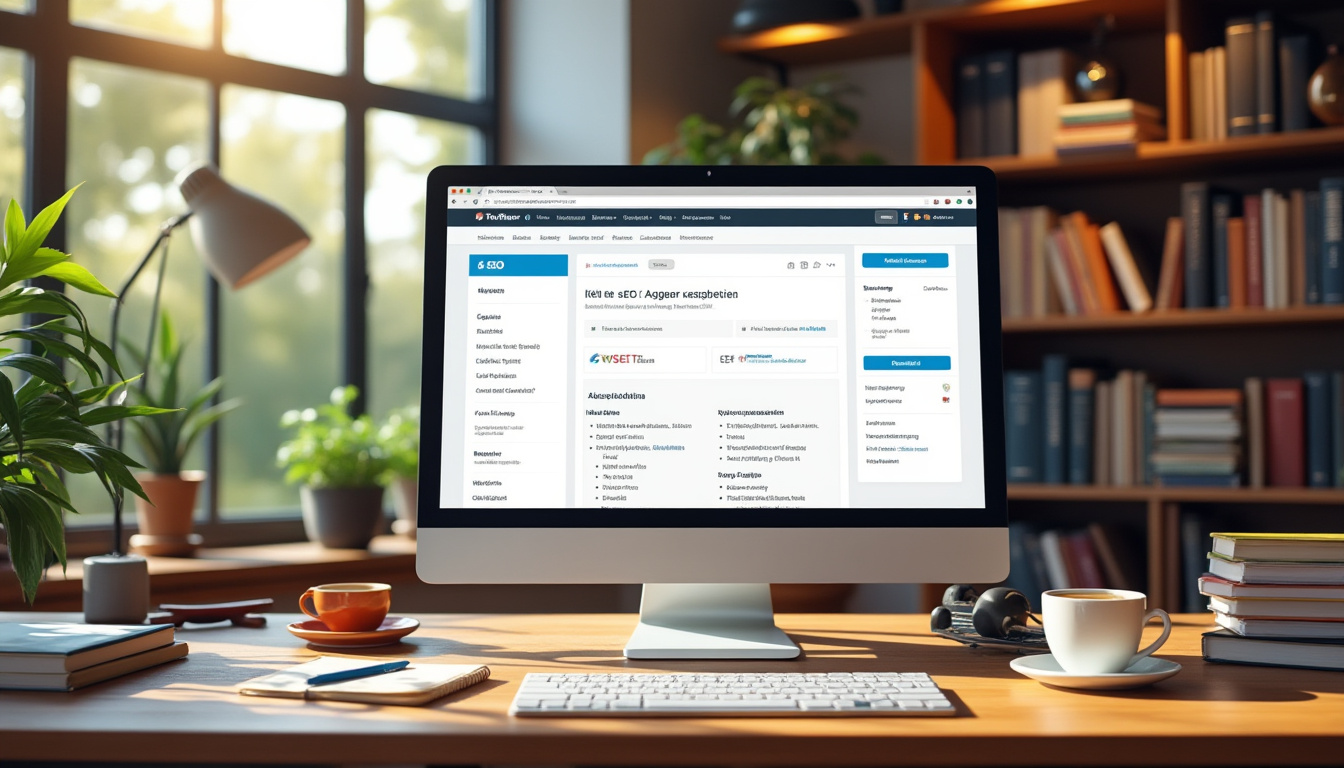When it comes to link building in WordPress, there are several best practices that can help elevate your site’s authority and visibility. Start by thoroughly understanding your audience, which allows you to create content that resonates with them. Develop a list of reputable sites that your target audience frequently visits and consider reaching out for potential collaborations.
Creating high-quality, engaging content is crucial, as this will make it more likely for other websites to link back to your resources. For optimal SEO performance, utilize internal linking strategically to enhance user experience and ensure search engines can efficiently navigate your site. Additionally, maintaining a diverse range of backlinks from various trustworthy sources can significantly impact your overall ranking.
Incorporate social media alongside your link building efforts, as this can increase content sharing and attract natural backlinks. Lastly, avoid common pitfalls like overusing anchor texts and inserting too many links, which could overwhelm readers and diminish usability.
Link building is an essential aspect of SEO that can significantly impact your website’s visibility and authority. In the WordPress ecosystem, employing effective link building strategies can help you create a robust online presence. This article explores the best practices for link building within WordPress, providing actionable insights that website owners can implement to enhance their link building efforts.
Understanding Your Audience
The first step in any successful link building strategy is to truly understand your audience. Knowing who your target audience is will allow you to create relevant content that resonates with them. Conduct thorough research to determine their interests, pain points, and the types of websites they frequently visit. This knowledge can guide your outreach efforts and help in identifying valuable partnership opportunities.
Identifying Target Websites
Once you have a clear understanding of your audience, the next step is to create a list of websites that they trust and frequent. Look for niche-specific websites, industry blogs, and forums where your audience engages. Tools like SEMrush or Ahrefs can help analyze backlink profiles to discover websites that link to similar content. This list will guide your outreach and guest blogging efforts, making them more targeted and effective.
Creating High-Quality Content
Content is at the heart of successful link building. By producing high-quality, valuable content, you not only attract visitors but also encourage other sites to link back to you. Focus on creating in-depth articles, infographics, and other content formats that provide unique insights or solutions. Aim for content that answers common questions in your industry, as this can position you as a thought leader and encourage organic linking.
Utilizing Guest Blogging
Guest blogging is a powerful strategy for acquiring backlinks and generating referrals. By writing quality articles for other websites, you can expose your work to a broader audience. When pursuing guest blogging opportunities, ensure that the sites you’re targeting are reputable and aligned with your niche. Craft compelling pitches and provide valuable content in your guest posts, including relevant links back to your site.
Implementing Internal Linking
While external links are vital, don’t overlook the importance of internal linking on your WordPress site. Internal links help search engines understand the structure of your website and distribute page authority. Use descriptive anchor text and link to relevant content within your site, enhancing the user experience and keeping visitors engaged longer.
Building Relationships with Influencers
Networking within your industry can yield valuable link building opportunities. Building relationships with influencers and thought leaders can lead to collaborations, social shares, and potential backlinks. Engage with them on social media, comment on their blogs, and provide genuine value in your interactions. When you establish rapport, reaching out for links becomes much more natural.
Utilizing Social Media Platforms
Social media can amplify your link building efforts. Share your content across various platforms, as this can attract attention and encourage others to link back to your website. Use targeted hashtags, engage with relevant communities, and actively participate in discussions to boost your online visibility. More visibility can lead to more backlink opportunities.
Leveraging Testimonials and Reviews
Providing testimonials for products you genuinely use can often result in backlinks. Many companies showcase customer reviews on their websites, providing an excellent opportunity for you to gain exposure. Write a thoughtful testimonial that highlights your experience and in return, you can request a link back to your site.
Avoiding Common Link Building Mistakes
When building links, it’s crucial to avoid common mistakes that can hinder your efforts. Overusing exact match anchor texts, targeting low-quality websites, or engaging in black-hat SEO practices can have negative consequences. Stay updated with the latest SEO guidelines and focus on natural, organic link acquisition strategies.
Monitoring Your Backlinks
Regularly monitoring your link profile is essential for understanding the performance of your link building efforts. Use tools such as Google Search Console to track your backlinks and identify any toxic links that may harm your site’s reputation. Addressing harmful backlinks promptly can prevent negative impacts on your SEO performance.
Utilizing SEO Tools for Link Building
There are numerous tools available to assist with your link building strategy. Tools like Backlinko provide comprehensive strategies, while SEO plugins such as Yoast can assist with optimizing metadata for your content. Using these tools can streamline your efforts and help you stay organized.
Focus on Local Link Building
If your business operates locally, pay special attention to local link building strategies. Connect with local organizations, participate in community events, and seek mentions on local blogs or news sites. These local backlinks can significantly enhance your visibility in local search results and establish your authority in the community.
Creating Link-Worthy Assets
Link-worthy assets, or linkable content, often include resources such as guides, tools, or research articles. Creating content that provides substantial value can naturally attract links from other sites. Invest time in content creation that is genuinely beneficial to your audience, and promote it through various channels.
Outreach Campaigns
Effective outreach is crucial for successful link building. Craft personalized emails to webmasters or bloggers in your niche. Be polite, concise, and explain why your content is relevant to their audience. Make sure to follow up if you don’t receive a response, as persistence can often lead to opportunities.
Utilizing Resource Pages and Directories
Many websites feature resource pages and directories that showcase valuable content in specific niches. Identify such pages within your industry and reach out to the administrators, suggesting your content as a valuable addition to their resources. This method can lead to high-quality backlinks and more visibility.
Keeping Up with SEO Trends
The world of SEO is constantly evolving. Staying informed about the latest trends and algorithm changes is vital for successful link building. Subscribe to industry newsletters, participate in forums, and follow SEO influencers to keep abreast of the latest best practices.
Implementing best practices for link building in WordPress requires a combination of strategy, creativity, and consistency. Focus on creating valuable content, engaging with your audience, and building meaningful relationships within your industry. By following these guidelines, you will enhance your site’s link profile and ultimately improve your overall SEO performance.

Link building is a crucial aspect of enhancing your website’s SEO and online visibility. In the world of WordPress, there are specific best practices that can significantly improve your campaign’s effectiveness. This article outlines strategies to create high-quality links, avoid common pitfalls, and leverage your WordPress site’s capabilities for better performance in search engine rankings.
Understand Your Audience
A key component of a successful link building strategy is to really know your audience. Understanding what your potential visitors are looking for allows you to create tailored content that resonates with them. This ensures that the links you build attract not only traffic but also genuinely interested visitors.
Create a Targeted List of Websites
Identify and compose a list of websites your audience visits. By knowing which platforms are popular among your target demographic, you can focus your outreach efforts more effectively. Aim to connect with relevant blogs and websites that cater to your niche, which increases the likelihood of gaining valuable backlinks.
Produce High-Quality Content
The foundation of any successful link building effort is great content. Content quality matters; producing insightful, engaging, and relevant blogs or articles makes your website more likely to attract backlinks. Aim for “link-worthy” content that provides immense value and can earn natural links from other websites.
Utilize Internal Linking
Internal links are powerful SEO tools. By effectively utilizing internal linking, you can enhance user experience and improve the overall performance of your website. Make sure to link to relevant pages within your site which helps guide visitors and improves your site’s SEO authority.
Outreach for Guest Blogging
Guest blogging remains one of the most effective methods to build links. Reach out to reputable blogs in your niche that accept guest posts. Offer them high-quality content in exchange for a site link back to yours. This not only boosts your backlink profile but also draws their audience to your site.
Avoid Common Link Building Mistakes
While link building can be beneficial, there are common mistakes that can harm your SEO efforts. Be sure to avoid overusing anchor texts, inserting too many backlinks, or relying solely on low-quality links. Focus instead on building relationships with reputable sites and ensuring high-quality references to your content.
Leverage Social Media for Link Building
Another effective strategy involves utilizing social media to build links. By sharing your content across social platforms, you can increase visibility and drive more traffic. Moreover, if your content resonates well enough, it may be shared by others, leading to additional backlinks.
Monitor Your Link Performance
Effective link performance monitoring is crucial for long-term success. Use tools available for WordPress to track the backlinks your site is generating. This allows you to analyze which strategies are working, as well as areas needing improvement.
By following these best practices for link building in WordPress, you can create a robust linking strategy that enhances your SEO, increases traffic, and maximizes your online presence. For further insights, check out resources like Backlinko or learn how to effectively monitor SEO performance on WordPress sites.
Link Building Best Practices Comparison
| Practice | Description |
| Create Quality Content | Focus on producing unique, engaging, and relevant content that naturally attracts backlinks. |
| Utilize Guest Blogging | Contribute to reputable blogs in your niche to gain exposure and high-quality backlinks. |
| Conduct Outreach | Reach out to other webmasters or bloggers for link placements based on mutual interests. |
| Leverage Social Media | Share your content across social platforms to increase visibility and referral traffic. |
| Analyze Competitors | Identify your competitors’ backlinks to find opportunities for your link building. |
| Internal Linking | Enhance the structure of your site by linking to relevant content within your own website. |
| Avoid Spammy Links | Stay clear of low-quality backlinks that can hurt your site’s authority and SEO performance. |
| Monitor Backlinks | Regularly check your backlink profile to ensure quality and relevancy. |
Link building is a crucial aspect of SEO that involves acquiring hyperlinks from other websites to your own. Implementing effective link building strategies can significantly enhance your site’s visibility in search engine results. In this article, we’ll explore the best practices for link building specifically tailored for WordPress users, ensuring your website gains the necessary authority and traffic.
Understand Your Audience
Before diving into link building, it’s essential to truly understand your target audience. Research their interests, preferences, and the kind of content they engage with. This insight will guide you in creating content that resonates well and is more likely to be linked by other sites. Tools like Google Analytics and social media insights can be invaluable in this phase.
Create Valuable Content
The foundation of effective link building lies in producing high-quality, valuable content that others want to reference. This could be in the form of blog posts, infographics, or videos. Content that solves problems, answers common questions, or provides useful tips tends to attract links naturally. Consider developing linkable assets, such as comprehensive guides or research studies, to boost your link-building efforts.
Identify Relevant Websites
Creating a list of websites that your audience frequents is crucial. Focus on reputable sites within your niche and compile a list of potential targets for outreach. Tools like Ahrefs or Moz can help identify potential link partners based on their domain authority and relevance. Ensure these sites have audiences that align with your own to maximize your link-building effectiveness.
Utilize Email Outreach
Email outreach is a powerful way to promote your content and gain backlinks. Craft personalized emails that explain why your content would be valuable for the recipient’s audience. Be concise and direct, and provide a compelling reason for them to link to your content. Following up on your initial outreach can also increase your chances of success.
Leverage Guest Blogging
Guest blogging on relevant websites allows you to showcase your expertise while earning backlinks. Look for opportunities on reputable blogs within your niche that accept guest contributions. Be sure to write original, insightful articles that provide real value, and include a link back to your site within the content or author bio.
Optimize Internal Links
While external link building is critical, don’t overlook the importance of internal linking. Use keyword-rich anchor text to link to relevant pages within your site. This not only helps with SEO but also improves user experience by guiding visitors to related content. Ensure your internal linking structure is logical and enhances navigation.
Avoid Common Mistakes
Be mindful of common link building mistakes. Buying links or using link farms can lead to penalties from search engines. Instead, focus on organic methods of link acquisition. Ensure your anchor text isn’t overly optimized and avoid overloading your pages with too many links. Quality over quantity should always be your mantra.
Monitor Your Progress
Track the success of your link building efforts through analytics tools. Monitoring your backlink profile allows you to see which strategies are working and which need improvement. Tools like Google Search Console and third-party SEO platforms can provide valuable insights into your link profile, helping you refine your approach over time.









